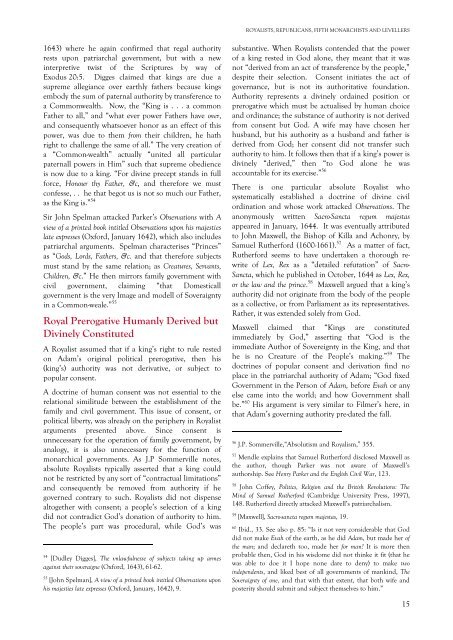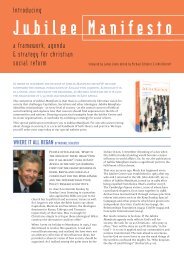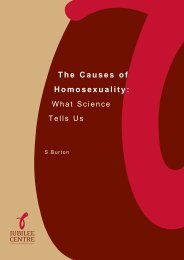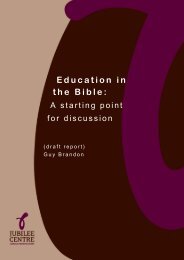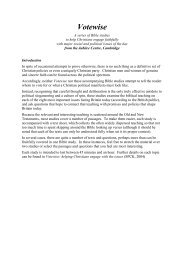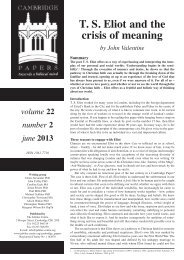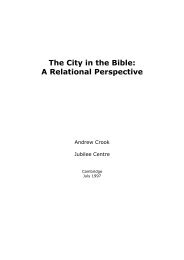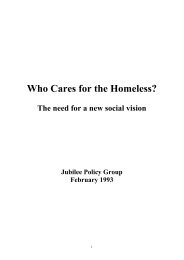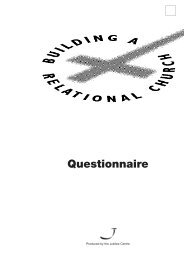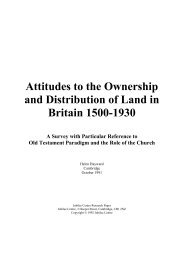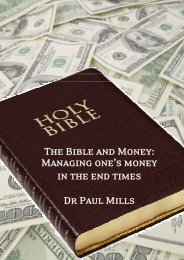Report Template - Jubilee Centre
Report Template - Jubilee Centre
Report Template - Jubilee Centre
Create successful ePaper yourself
Turn your PDF publications into a flip-book with our unique Google optimized e-Paper software.
ROYALISTS, REPUBLICANS, FIFTH MONARCHISTS AND LEVELLERS<br />
1643) where he again confirmed that regal authority<br />
rests upon patriarchal government, but with a new<br />
interpretive twist of the Scriptures by way of<br />
Exodus 20:5. Digges claimed that kings are due a<br />
supreme allegiance over earthly fathers because kings<br />
embody the sum of paternal authority by transference to<br />
a Commonwealth. Now, the “King is . . . a common<br />
Father to all,” and “what ever power Fathers have over,<br />
and consequently whatsoever honor as an effect of this<br />
power, was due to them from their children, he hath<br />
right to challenge the same of all.” The very creation of<br />
a “Common-wealth” actually “united all particular<br />
paternall powers in Him” such that supreme obedience<br />
is now due to a king. “For divine precept stands in full<br />
force, Honour thy Father, &c, and therefore we must<br />
confesse, . . he that begot us is not so much our Father,<br />
as the King is.” 54<br />
Sir John Spelman attacked Parker’s Observations with A<br />
view of a printed book intitled Observations upon his majesties<br />
late expresses (Oxford, January 1642), which also includes<br />
patriarchal arguments. Spelman characterises “Princes”<br />
as “Gods, Lords, Fathers, &c. and that therefore subjects<br />
must stand by the same relation; as Creatures, Servants,<br />
Children, &c.” He then mirrors family government with<br />
civil government, claiming “that Domesticall<br />
government is the very Image and modell of Soveraignty<br />
in a Common-weale.” 55<br />
Royal Prerogative Humanly Derived but<br />
Divinely Constituted<br />
A Royalist assumed that if a king’s right to rule rested<br />
on Adam’s original political prerogative, then his<br />
(king’s) authority was not derivative, or subject to<br />
popular consent.<br />
A doctrine of human consent was not essential to the<br />
relational similitude between the establishment of the<br />
family and civil government. This issue of consent, or<br />
political liberty, was already on the periphery in Royalist<br />
arguments presented above. Since consent is<br />
unnecessary for the operation of family government, by<br />
analogy, it is also unnecessary for the function of<br />
monarchical governments. As J.P Sommerville notes,<br />
absolute Royalists typically asserted that a king could<br />
not be restricted by any sort of “contractual limitations”<br />
and consequently be removed from authority if he<br />
governed contrary to such. Royalists did not dispense<br />
altogether with consent; a people’s selection of a king<br />
did not contradict God’s donation of authority to him.<br />
The people’s part was procedural, while God’s was<br />
54<br />
[Dudley Digges], The vnlawfulnesse of subjects taking up armes<br />
against their soveraigne (Oxford, 1643), 61-62.<br />
55<br />
[John Spelman], A view of a printed book intitled Observations upon<br />
his majesties late expresses (Oxford, January, 1642), 9.<br />
substantive. When Royalists contended that the power<br />
of a king rested in God alone, they meant that it was<br />
not “derived from an act of transference by the people,”<br />
despite their selection. Consent initiates the act of<br />
governance, but is not its authoritative foundation.<br />
Authority represents a divinely ordained position or<br />
prerogative which must be actualised by human choice<br />
and ordinance; the substance of authority is not derived<br />
from consent but God. A wife may have chosen her<br />
husband, but his authority as a husband and father is<br />
derived from God; her consent did not transfer such<br />
authority to him. It follows then that if a king’s power is<br />
divinely “derived,” then “to God alone he was<br />
accountable for its exercise.” 56<br />
There is one particular absolute Royalist who<br />
systematically established a doctrine of divine civil<br />
ordination and whose work attacked Observations. The<br />
anonymously written Sacro-Sancta regum majestas<br />
appeared in January, 1644. It was eventually attributed<br />
to John Maxwell, the Bishop of Killa and Achonry, by<br />
Samuel Rutherford (1600-1661). 57 As a matter of fact,<br />
Rutherford seems to have undertaken a thorough rewrite<br />
of Lex, Rex as a “detailed refutation” of Sacro-<br />
Sancta, which he published in October, 1644 as Lex, Rex,<br />
or the law and the prince. 58 Maxwell argued that a king’s<br />
authority did not originate from the body of the people<br />
as a collective, or from Parliament as its representatives.<br />
Rather, it was extended solely from God.<br />
Maxwell claimed that “Kings are constituted<br />
immediately by God,” asserting that “God is the<br />
immediate Author of Sovereignty in the King, and that<br />
he is no Creature of the People’s making.” 59 The<br />
doctrines of popular consent and derivation find no<br />
place in the patriarchal authority of Adam; “God fixed<br />
Government in the Person of Adam, before Evah or any<br />
else came into the world; and how Government shall<br />
be.” 60 His argument is very similar to Filmer’s here, in<br />
that Adam’s governing authority pre-dated the fall.<br />
56<br />
J.P. Sommerville,“Absolutism and Royalism,” 355.<br />
57<br />
Mendle explains that Samuel Rutherford disclosed Maxwell as<br />
the author, though Parker was not aware of Maxwell’s<br />
authorship. See Henry Parker and the English Civil War, 123.<br />
58<br />
John Coffey, Politics, Religion and the British Revolutions: The<br />
Mind of Samuel Rutherford (Cambridge University Press, 1997),<br />
148. Rutherford directly attacked Maxwell’s patriarchalism.<br />
59<br />
[Maxwell], Sacro-sancta regum majestas, 19.<br />
60<br />
Ibid., 33. See also p. 85: “Is it not very considerable that God<br />
did not make Evah of the earth, as he did Adam, but made her of<br />
the man; and declareth too, made her for man? It is more then<br />
probable then, God in his wisdome did not thinke it fit (that he<br />
was able to doe it I hope none dare to deny) to make two<br />
independents, and liked best of all governments of mankind, The<br />
Soveraignty of one, and that with that extent, that both wife and<br />
posterity should submit and subject themselves to him.”<br />
15


